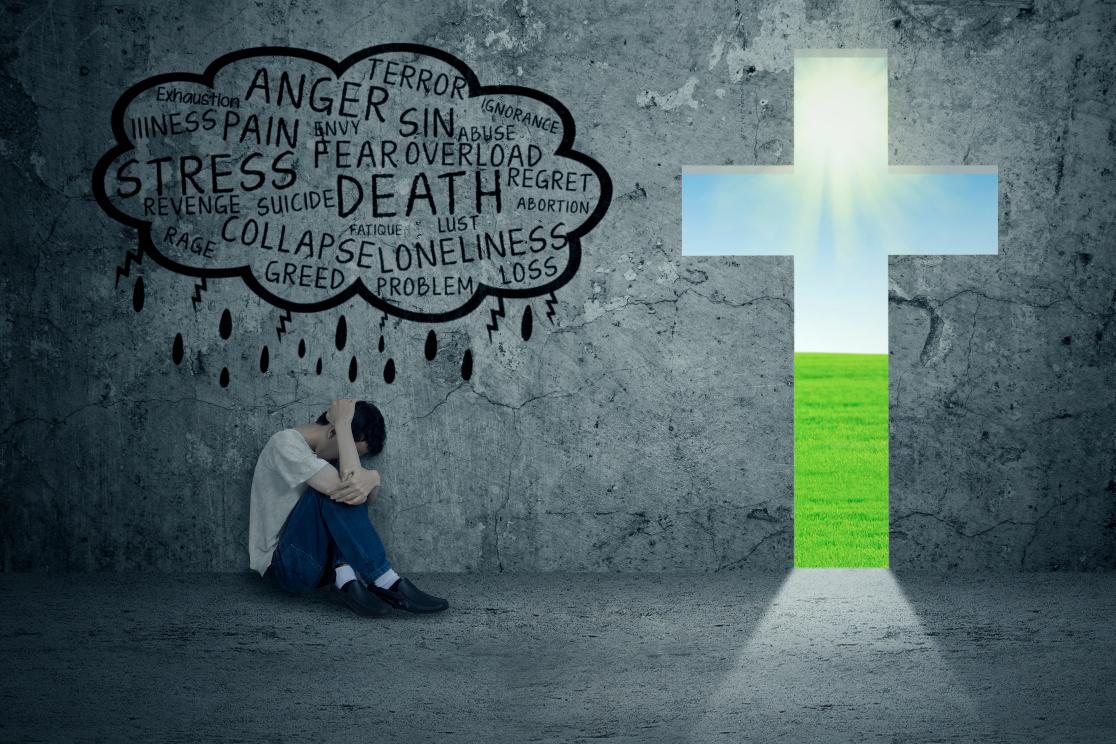Anxiety and depression tend to be very touchy subjects from a christian perspective. This is because the perspectives of mental disorders differ greatly throughout the church. The disorders themselves are complex with manifestations and symptoms that are varied from one individual to another.
The church is not the only group that has incorrect beliefs about mental disorders, we see these all across our culture. Many of the misconceptions of the church about mental disorders are caused because they try to understand anxiety and clinical depression from a scriptural point of view. When it comes to these attitudes, generalization is often needed. WEll meaning Christians can often get things wrong.
There is a lot of available information about depression and anxiety, and we wouldn’t be able to sum it all up in one article. But as a Christian, as the church, if we are all going to be talking about these issues, here are 5 things we should all know and keep in consideration.
- Depression is Not Always What the Church Says/Thinks it Is
Depression is often thought by the church to be a spiritual disorder, emotional dysfunction or a character defect. None of these are true, people don’t make the choice to be depressed, and they cannot simply “try” to not be depressed as they are often asked. This would be like someone asking you not to bleed when you have been shot. The church can often treat depressed members as if the depression is their fault because they didn’t have enough faith.
Christians have a high regard for their ability to have faith in the healing ability of their God. Personal faith can push you to try and deal with depression on your own and as you wait on God to help you through your depression you may increase your depression. Having faith in the powers of divine and supernatural beings is all well and good, but refusing psychiatric and medical treatment is just like refusing medication to manage your diabetes. The only difference is the former is invisible.
Many faith groups even go as far as to suggest that a demonic attack is the cause of depression. We can agree that there is a spiritual element at play, but the fact of the matter is that major depressive disorder is very real and there are many causes of it.
- A Mental Disorder is Not a Sin
There are sins that contribute to depression, these include physical abuse, neglect and substance abuse. These sins sometimes almost always continue through the depression as people use them as coping mechanisms. But this still doesn’t mean that the person riddled by depression is a sinner because they are affected by this crushing mental health condition.
When mental health is treated as an unconfessed sin, it usually leads to alienation. When people feel like their depression is a sin, they may not want to seek treatment. This can also result in an unhealthy response to depression when its root cause is misunderstood or ignored for religious reasons.
- The Bible Doesn’t Provide the “Easy Answers”
The Bible is known to be a rich book, filled with encouragement and wisdom for persons suffering from anxiety and depression. You may be familiar with scriptures that are commonly quoted, such as “be anxious for nothing…” The truth is, these are often taken way out of context. The intent of the passage is misconstrued into not doing anything and not getting help, instead waiting on God to fix it.
This can be hard for devout Chrisitans because in the hardest part of their illness they may feel like they are not obeying God. This is like throwing gasoline into the fire of the already present depression.
If we really and truly examine anxiety and depression in the Bible, we see the existential dread that comes along with depression and not an antidote or an easy way out. It is not always apparent what God is doing in your lives. There are stories of depressed individuals in the Bible, and we overlook these, for example David said “I am forgotten by them as though I were dead”, this accurately describes the feelings of severe depression.
Instead of using a bible verse out of context, a better strategy would be to offer comfort and help to persons in the church who are anxious, depressed and in need of help.
- Anxiety and Depression Often Looks Different From What We Think
A Lot of people who are depressed may not seem depressed to their acquaintances. Over time, people who are depressed learn to hide their symptoms very well. Some will even have the ability to hide them from their doctors. Most often they will hide these symptoms and feelings because of the stigma that is attached to depression.
With many churches not addressing mental illness, there is more incentive to keep it all hidden. With depression the symptoms can sometimes contradict each other and so it can be hard to recognize when one is actually depressed. That is just one of the reasons that clinical diagnosis is necessary to determine if one is in fact depressed or not.
Learning to recognize the signs of depression can help someone to choose to find treatment earlier and thus get better earlier. The people who are actually suffering may be the people you would have never thought to be suffering.
Do you struggle with depression?
We have clinicians expert on depression, feel free to read about them, or book a free consultation to review your situation.
- A Strong Church Can’t Fix Depression
Many churches are ineffective at helping their members deal with depression even when they have programs to help. Some churches have such a strong stance against depression that they prevent their members from seeking the support they need from therapy.
Even when churches have groups and programs for dealing with depression, they do not have the necessary framework to deal with clinical depression. Pastoral staff aren’t equipped to deal with depression in the way that a clinical psychologist can. Church groups often do not provide a judgment free space for people to discuss their issues. And so a therapy session with a professional could provide the best relief and the beast help. You can feel out our service by taking advantage of our free consultation to see if we are a good fit for you.
We have programs that can be invaluable to you. We will be able to create a carefully planned strategy for you to move forward as you work to quell your depression. We understand depression and all the related conditions that tend to come along with it. We can help you to develop a more positive response to your stressors and triggers.
While churches have the best intentions when they are dealing with mental illness issues, there are times when clinical conditions are misinterpreted and these conditions may be exacerbated by the response that is used to meet them. They may also demoralize suffering which can further exacerbate the depression.
Help for Depressed Christians

Many of us who are not struggling with depression, struggle with how to deal with our depressed loved ones. Oftentimes it can be confusing for those who want to help, and so they may hold back. Here are guidelines you can use to help those around you that may be depressed.
- Prepare – We all find loved ones with depression throughout our lifetime. Depression is the 3rd most common reason people consult their family doctor. You can prepare by reading up like you are doing now. Some of the information you find may be surprising, especially about who gets depressed. So often the people who you would think would not get depressed are the ones who do. Think type-A personalities, people with a life that is going seemingly well and high achievers.
- Don’t Assume – The Christian community can be of the notion that depression is caused by a sin but let us not share that assumption. Just like heart disease or cancer, you can get depression and none of these are due to a sin that you committed or your parents committed.
Many times the most godly are the ones that suffer from depression the most. They tend to be more sensitive to evil and sin in themselves and are often the ones that offer an overcommitted service to the Lord. They are thought of as special targets for satanic attacks and so if they disclose their depression it can be really hard for them to deal with it based on the church’s approach.
Even if there are spiritual symptoms this doesn’t mean that there is a spiritual cause behind the depression. Spiritual consequences can be symptoms of a cognitive or physical problem.
- Pay Attention to the Dimensions – Look at the symptoms. You will find twelve to fifteen symptoms of depression in most literature. If your loved one seems to be exhibiting at least five of those you should be concerned about them.
Depression is more than feeling a little anxious or sad. It is when these feelings have an unusual intensity that starts to incapacitate someone and damage their life.
Then you want to look at the duration of the symptoms. People who are suffering from depression are typically feeling sad for weeks on end.
If you are seeing the symptoms, the intensity and duration, it may be time to contact a medical doctor.
- Accept the Possibility of Medication – While you don’t want to rush to take medications for depression, you also don’t want to rule it out. It is rarely ever the first option for treatment as many times the emotional upheaval that ensues is temporary. Sometimes a bit of understanding, a bit of counseling and some family support can make a huge difference.
If it is necessary, medication should never be refused. Medication for depression may be thought of as being unbiblical, but this is not true. Just as you would take medication for other illnesses, you will also want to take medications prescribed to you for depression.
- Consider the Holistic Approach – Simply popping a pill will not cure depression. Usually, with depression there is a range of issues that need to be checked and medication will only work for some of those. A holistic approach takes into consideration the entire humanity. This approach takes consideration of lifestyles, bodily symptoms, life events, thinking patterns, spiritual factors and social factors and how all these affect the situation and how their manipulation may affect the treatment.
- Get Family And Friends Involved – a professional cannot be with a depressed person every day of the week and so family and friends have to get involved for the successful long term recovery of someone dealing with depression. Friends and family can help the depressed individual to build the four R’s into their lives. These are Rest, Recreation, Relaxation and Routine.
- Maintain Your Spiritual Routine – routine is one of the R’s and it is important to maintain one’s spiritual disciplines even if the church is not being supportive in your search for a treatment outside of the word. Still, daily reading of the word and prayer can help, just keep it short and simple. You can help by praying and reading with a loved one who is suffering from depression and in recovery. Point your loved one to the scriptures that have objective truths about God’s character. And let their hearts take comfort in that while their minds are a bit muddy as they struggle with their depression.
- Share a Message Of Hope – People feel hopeless when they are depressed. You can help them find some hope by showing them how Christians in the bible have suffered with depression and got better over time. Give them the assurance that you will not leave them and you are there to help and support them.

You can further provide the support of your loved one by helping them with their appointments. Provide them with a means of transportation, sit with them in the waiting room if possible and make the necessary arrangements for them to support their recovery. Here at ESTADT we can help you support your Christian loved one. We know that deciding how to deal with depression as a christian can be very hard, but we can help. Reach out to us if you need help that you can’t find in your church. We would love to help you on your road to recovery. If you are not ready to reach out to us just yet you can check out our resources section and do some more reading.
Do you struggle with depression?
We have clinicians expert on depression, feel free to read about them, or book a free consultation to review your situation.
